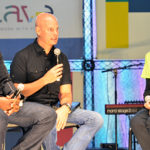AUSTIN—Racial injustice abounds in America, and it won’t be resolved until the nation’s clergy demonstrate “relationships of equality,” a trio of African-American pastors told a multiracial crowd gathered by the Texas Baptist Christian Life Commission.
“Let Justice Roll Down: African-American Perspectives on Justice” highlighted the CLC Advocacy Day in Austin April 9. The commission sponsors the event during each Texas legislative session, primarily to educate Baptists on political issues and to allow them to voice their concerns to lawmakers.
 Christian Life Commission Director Gus Reyes, Pastor Michael Evans of Bethlehem Baptist Church in Mansfield, and Jorge Zayasbazan, senior pastor at Baptist Temple Church in San Antonio, at Advocacy Day in Austin. (Photo / Baptist Temple, San Antonio)But the African-American pastors’ noontime discussion riveted attention on racial currents ricocheting across the country.
Christian Life Commission Director Gus Reyes, Pastor Michael Evans of Bethlehem Baptist Church in Mansfield, and Jorge Zayasbazan, senior pastor at Baptist Temple Church in San Antonio, at Advocacy Day in Austin. (Photo / Baptist Temple, San Antonio)But the African-American pastors’ noontime discussion riveted attention on racial currents ricocheting across the country.
Asked to cite “unjust situations” in America, Michael Evans, pastor of Bethlehem Baptist Church in Mansfield, countered: “Where do we start?”
“DWB—‘driving while black,’” he began. “Walking in a store and being watched the whole time. There are 10,000 things. …”
He cited a litany of racial concerns: “Erosion of the Voting Rights Act, the ‘criminal injustice system,’ resegregation of our school systems and the collective amnesia of Americans, who have forgotten this is an immigrant nation.”
“You cannot live in this country if you are African-American without seeing some form of injustice,” reported Delvin Atchison, pastor of Antioch Missionary Baptist Church in Waco.
“There’s no denying I’m black,” he said. “Being black has carried this idea—not that I’m ‘other than’ (whites), but that I’m ‘less than.’”
The challenge of building self-esteem
Sign up for our weekly edition and get all our headlines in your inbox on Thursdays
Tragically, many African-Americans have bought into that thinking, and when they see white people, they think, “better than,” Atchison added, noting racism has left African-American pastors with the monumental challenge of building self-esteem among their parishioners.
“I learned about justice and injustice long before I knew what the Bible says about it,” noted Joseph Parker, pastor of David Chapel Missionary Baptist Church in Austin.
He recounted growing up in Birmingham, Ala., in the 1950s and ’60s, the only son of a Baptist pastor who worked alongside Martin Luther King Jr. in the Civil Rights Movement.
Back then, Birmingham was an “evil, unjust city,” and Parker attended segregated schools through the eighth grade. He was the first African-American from his neighborhood to integrate the nearby high school in ninth grade.
“It was not a good time,” he recalled, telling also about arriving at 16th Street Baptist Church as smoke still hung in the air after white supremacists bombed the building, killing little girls.
Even then, Parker’s father shared pulpits with white pastors, and he saw whites protest for civil rights alongside blacks.
“God stirred up in me out of those experiences a commitment to build up race relations,” he said.
Racism has come full circle
Sadly, racism has come full circle in America, he added. His three daughters—ages 32, 29 and 19—“still have Groundhog Day; they still go through what I did,” he explained.
Although well-meaning people claim America is a color-blind society, “that is a bad thing,” contended Evans, the Christian Life Commission’s chairman. “If you say you are color-blind, then you say I am invisible. … You don’t see the experiences I go through.”
A step toward racial reconciliation is acknowledging racial differences, Atchison added. Rather than calling America a “melting pot,” where all differences are blended away, society should be seen as a “salad bowl,” where the uniqueness of races and ethnicities is noticed and appreciated, he explained.
“It’s the mystery of God that brings us together,” he said. “The reason we can stay in this country … is God is working. … If not for a forgiving heart, being black in this country would be unbearable.”
Acknowledgment of racial differences even extends to worship, Evans said, pointing to the vast difference in worship styles among African-Americans and Anglos.
“One is not better than the other,” he said. “They grew out of the cultural ethos—for both groups. We need mutual acceptance, and recognition is important.”
Likewise, honest discussion is vital, insisted Parker, a member of the Baptist Standard Publishing board of directors.
He described “a bad day” 20 years ago, when he received a letter from white pastors, asking him to join them in refusing to perform weddings until couples agreed to premarital counseling.
“I was tired of them coming to me, wanting me to join them in their issues, but they never wanted to get involved in my issue, in racial reconciliation,” he said.
Accountability groups helping span the racial chasm
Parker met with Anglo pastors, which resulted in a statement of racial reconciliation affirmed by 300 pastors across Austin. More importantly, it led to small multiracial accountability groups, “pastors in covenant.” Parker’s group—still meeting after 20 years—has demonstrated unvarnished honesty and healing vulnerability that has spanned the racial chasm.
Unfortunately, such relationships are rare across the nation, he lamented.
“Pastors are not modeling (reconciliation) in their own relationships, and their people are not seeing it,” he said. “We need our pastors to get on board and have relationships of equality … which will produce durable friendships.”
Those relationships will be built upon “dialogue that is absent of judgment,” Atchison said. They will acknowledge, “It’s OK to feel uncomfortable” in the quest for understanding.














We seek to connect God’s story and God’s people around the world. To learn more about God’s story, click here.
Send comments and feedback to Eric Black, our editor. For comments to be published, please specify “letter to the editor.” Maximum length for publication is 300 words.